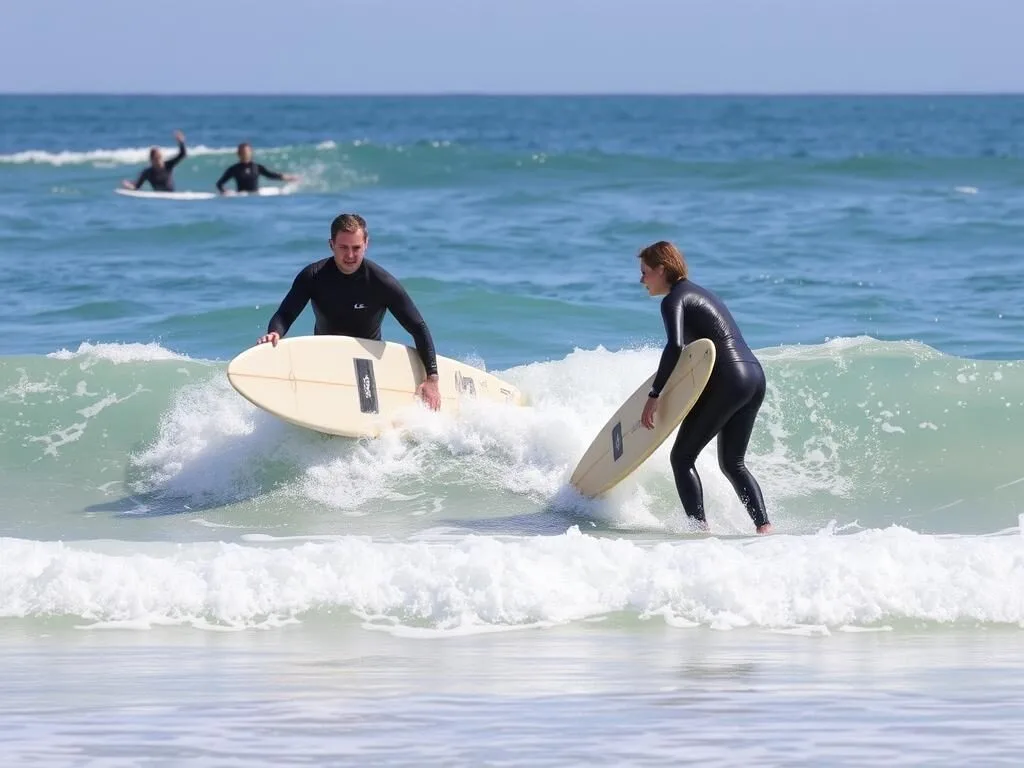Did you know Byron Bay’s iconic lighthouse records 2,700+ sunshine hours annually – more than Sydney or Brisbane? This sun-drenched paradise on Australia’s easternmost point isn’t just famous for its stunning beaches and laid-back lifestyle – it’s blessed with a subtropical climate that makes it appealing year-round. But timing your visit can make all the difference between battling summer crowds or enjoying perfect beach days with minimal rainfall. Let’s explore when to experience Byron Bay at its absolute best.
Getting There & Planning Your Journey
Byron Bay sits approximately 165 km (102 miles) south of Brisbane and 770 km (478 miles) north of Sydney. While the town doesn’t have its own commercial airport, there are several convenient options to reach this coastal gem.
Nearest Airports
- Ballina Byron Gateway Airport: Just 30 minutes south (35 km/22 miles), this is the closest airport with regular domestic flights from Sydney, Melbourne and Newcastle.
- Gold Coast Airport: Located about 45 minutes north (65 km/40 miles), offering more domestic and some international flight options.
- Brisbane Airport: The largest nearby international gateway, about 2 hours north (170 km/105 miles) with shuttle services available.
For the best flight deals to these airports, we recommend checking at least 2-3 months before your planned visit.
Getting to Byron Bay

- Shuttle Services: Regular airport shuttles operate from all three airports to Byron Bay town center.
- Rental Car: The most flexible option for exploring the region. are available at all nearby airports.
- Public Transport: Limited bus services connect from nearby towns, but schedules can be restrictive.
Weather can impact your journey, particularly during the summer wet season (December-February) when occasional heavy rainfall may affect road conditions. Plan accordingly if visiting during these months.
Best Time to Visit & Weather Tips
Byron Bay enjoys a subtropical climate with warm summers and mild winters. With average annual rainfall of 1,730 mm (68 in), timing your visit can significantly impact your experience. Let’s break down Byron Bay’s weather patterns to help you plan the perfect trip.

Byron Bay Weather: Month-by-Month Guide
| Month | Weather | What to Wear | Things to Do | Pros & Cons |
| January | 28°C/82°F high, 21°C/70°F low, 165mm/6.5in rain, 13.5h daylight | Light breathable clothing, swimwear, hat, reef-safe sunscreen | Beach swimming, Falls Festival, New Year celebrations | ✅ Perfect beach weather ❌ Peak crowds, high prices, afternoon storms |
| February | 28°C/82°F high, 21°C/70°F low, 180mm/7.1in rain, 13h daylight | Light breathable clothing, swimwear, rain jacket | Morning beach visits, rainforest walks, indoor dining | ✅ Warm ocean temperatures ❌ Highest rainfall, humidity, jellyfish season |
| March | 27°C/81°F high, 20°C/68°F low, 165mm/6.5in rain, 12h daylight | Light layers, swimwear, light rain jacket | Byron Bay Bluesfest (Easter), surfing, coastal walks | ✅ Post-summer crowd reduction ❌ Still considerable rainfall |
| April | 25°C/77°F high, 18°C/64°F low, 140mm/5.5in rain, 11.5h daylight | Light layers, light jacket for evenings | Bluesfest (if Easter falls in April), hiking, farmers markets | ✅ Comfortable temperatures, fewer tourists ❌ Occasional rain showers |
| May | 22°C/72°F high, 15°C/59°F low, 120mm/4.7in rain, 11h daylight | Layers, light jacket, closed shoes | Whale watching begins, Byron Writers Festival, hiking | ✅ Pleasant temperatures, good value ❌ Water getting cooler |
| June | 20°C/68°F high, 12°C/54°F low, 130mm/5.1in rain, 10.5h daylight | Warm layers, light jacket, scarf | Whale watching, Winter Solstice celebration, hinterland tours | ✅ Lowest tourist numbers, best deals ❌ Too cool for swimming |
| July | 19°C/66°F high, 11°C/52°F low, 100mm/3.9in rain, 10.5h daylight | Warm layers, jacket, beanie for evenings | Splendour in the Grass festival, whale watching, hiking | ✅ Clearest skies, lowest humidity ❌ Coolest month, festival crowds |
| August | 20°C/68°F high, 11°C/52°F low, 80mm/3.1in rain, 11h daylight | Layers, light jacket | Whale watching peak season, Byron Bay Film Festival | ✅ Lowest rainfall, clear skies ❌ Cool ocean temperatures |
| September | 22°C/72°F high, 13°C/55°F low, 60mm/2.4in rain, 12h daylight | Light layers, swimwear on warmer days | Sample Food Festival, whale watching, surfing | ✅ Warming temperatures, wildflowers ❌ Water still cool for swimming |
| October | 24°C/75°F high, 16°C/61°F low, 85mm/3.3in rain, 12.5h daylight | Light layers, swimwear | Surfing, lighthouse walks, beach days | ✅ Perfect temperatures, pre-holiday quiet ❌ Gradual increase in visitors |
| November | 25°C/77°F high, 18°C/64°F low, 115mm/4.5in rain, 13h daylight | Light clothing, swimwear, hat, sunscreen | Beach days, surfing, paddleboarding | ✅ Warm but not hot, pre-holiday deals ❌ Increasing humidity |
| December | 27°C/81°F high, 20°C/68°F low, 135mm/5.3in rain, 13.5h daylight | Light breathable clothing, swimwear, hat, sunscreen | Beach days, Christmas markets, New Year’s preparations | ✅ Festive atmosphere, warm water ❌ Rising crowds, increasing prices |
Byron Bay by Season
Summer (Dec-Feb)
Weather: 28°C/82°F avg, humid with afternoon storms
What to Wear: Light breathable clothing, swimwear, hat, reef-safe sunscreen
Things to Do: Beach swimming, surfing, Falls Festival, New Year celebrations
Pros: Perfect beach weather, warm ocean, vibrant atmosphere
Cons: Peak crowds, highest prices, afternoon storms, high humidity
Autumn (Mar-May)
Weather: 25°C/77°F avg, gradually cooling with decreasing rainfall
What to Wear: Light layers, light jacket for evenings
Things to Do: Byron Bay Bluesfest, hiking, farmers markets, early whale watching
Pros: Comfortable temperatures, fewer tourists, good value
Cons: March can still be wet, ocean cooling by May
Winter (Jun-Aug)
Weather: 20°C/68°F avg, cool nights, lowest rainfall
What to Wear: Warm layers, jacket, beanie for evenings
Things to Do: Whale watching, Splendour in the Grass festival, hinterland tours
Pros: Lowest tourist numbers (except during festivals), best deals, clear skies
Cons: Too cool for swimming, chilly nights
Spring (Sep-Nov)
Weather: 24°C/75°F avg, warming with moderate rainfall
What to Wear: Light layers, swimwear on warmer days
Things to Do: Sample Food Festival, whale watching, surfing, lighthouse walks
Pros: Perfect temperatures, wildflowers, pre-holiday quiet
Cons: Water still cool in early spring
Getting Around Locally
Byron Bay’s compact town center is perfectly walkable, with most attractions within a 15-20 minute stroll. However, to explore the broader region including nearby beaches and hinterland, you’ll need transportation.
Local Transport Options
- Walking: The most popular way to get around central Byron Bay.
- Cycling: Bike rentals are widely available (approximately $15-25 AUD per day).
- Local Buses: Limited services connect Byron with nearby towns and beaches.
- Rental Cars: Ideal for exploring the hinterland and surrounding areas. during peak seasons.
- Ride Shares: Uber and local taxi services operate throughout the area.
During the best months to visit Byron Bay (September-November), rental bikes are an excellent option as the weather is perfect for cycling without being too hot or wet.

Where to Stay in Byron Bay
Accommodation options in Byron Bay vary widely from luxury beachfront resorts to budget-friendly hostels. Prices fluctuate significantly based on the season, with peak rates during summer (December-February) and major festivals.

Beachfront Luxury
For those seeking premium experiences, Byron Bay offers world-class beachfront accommodations with stunning ocean views.
- Luxury resorts with infinity pools
- Private beach access
- Full-service spas and restaurants
- Price range: $400-1,200+ AUD/night
Best time to book: June-August for better rates, 3-6 months in advance for peak season.

Mid-Range & Boutique
Byron Bay excels in unique, character-filled boutique accommodations that offer comfort without the premium price tag.
- Boutique hotels and guesthouses
- Self-contained apartments
- Eco-retreats in the hinterland
- Price range: $180-400 AUD/night
Best time to book: Shoulder seasons (April-May, September-November) offer the best value.

Budget-Friendly Options
Byron Bay welcomes budget travelers with a range of affordable options that still capture the town’s laid-back vibe.
- Backpacker hostels with social atmosphere
- Budget motels and guesthouses
- Camping and caravan parks
- Price range: $30-180 AUD/night
Best time to book: Winter months (June-August) offer lowest rates, except during festivals.
Seasonal Accommodation Tip: If visiting during the best months to visit Byron Bay (September-November), book at least 2-3 months in advance. For summer and festival periods, 6+ months advance booking is recommended. Apply reef-safe sunscreen – marine parks protect 22,000+ marine species in the waters around Byron Bay.
Dining & Local Cuisine

Byron Bay’s food scene reflects its coastal location and health-conscious community. From beachfront cafes to farm-to-table restaurants, the dining options emphasize fresh, local ingredients and global influences.
Culinary Highlights
- Fresh Seafood: Locally caught fish and prawns feature prominently on menus.
- Farm-to-Table: The fertile hinterland provides abundant fresh produce.
- Health-Focused: Vegetarian, vegan, and organic options abound.
- Multicultural Influences: Asian fusion, Mediterranean, and modern Australian cuisine.
- Craft Beverages: Local breweries, distilleries, and coffee roasters.
During the best months to visit Byron Bay (September-November), you’ll find the farmers markets brimming with spring produce and outdoor dining at its most pleasant.
Seasonal Food Experiences
Summer (Dec-Feb)
- Beachside dining with tropical fruits
- Fresh seafood platters
- Cooling acai bowls and smoothies
- Evening food markets
Autumn/Winter (Mar-Aug)
- Cozy cafe brunches
- Hearty hinterland produce
- Truffle season specialties
- Indoor dining experiences
Spring (Sep-Nov)
- Farm tours and tastings
- Sample Food Festival
- Alfresco dining
- Saturday Farmers Market
Attractions, Sightseeing & Activities
Byron Bay offers a diverse range of activities throughout the year, but certain experiences shine during particular seasons. Here’s what to do during the best months to visit Byron Bay.

Must-Do Byron Bay Experiences

Cape Byron Lighthouse Walk
This iconic 3.7 km (2.3 mile) loop takes you to Australia’s easternmost point with breathtaking coastal views.
Best season: Spring (Sep-Nov) for wildflowers and whale watching or winter (Jun-Aug) for clearest skies.
Tip: Start early morning for sunrise views and to avoid midday heat.

Whale Watching
Witness the majestic humpback whale migration as over 35,000 whales pass by Byron Bay annually.
Best season: Winter to early spring (Jun-Oct) with peak activity in July-August.
Tip: Cape Byron Lighthouse offers excellent land-based viewing, or book a boat tour for closer encounters.

Surfing Lessons
Byron Bay is renowned for its excellent surfing conditions suitable for all skill levels.
Best season: Autumn (Mar-May) for consistent swells and fewer crowds.
Tip: Beginners should start at Main Beach or Clarkes Beach, while experienced surfers head to The Pass or Tallow Beach.
Seasonal Activities Calendar
| Season | Top Activities | Special Events |
| Summer (Dec-Feb) | Beach swimming, kayaking with dolphins, rainforest walks, sunrise hot air balloon rides | Falls Festival (Dec/Jan), Soul Street New Year’s Eve, Byron Bay Surf Festival (Feb) |
| Autumn (Mar-May) | Surfing, coastal walks, hinterland exploring, farmers markets, spa retreats | Byron Bay Bluesfest (Easter), Bangalow Billy Cart Derby (May), Byron Bay International Fashion Festival |
| Winter (Jun-Aug) | Whale watching, hinterland tours, cooking classes, yoga retreats, stargazing | Splendour in the Grass (Jul), Byron Writers Festival (Aug), Winter Solstice Festival (Jun) |
| Spring (Sep-Nov) | Lighthouse walks, mountain biking, kayaking, paddleboarding, whale watching (early spring) | Sample Food Festival (Sep), Byron Bay Film Festival (Oct), Byron Bay Surf Festival (Nov) |
Practical Travel Tips
Weather Preparation
- Summer visitors: Pack reef-safe sunscreen, hat, light breathable clothing, and a light rain jacket for afternoon storms.
- Winter visitors: Bring layers for cool evenings (temperatures can drop to 8°C/46°F) and a warm jacket.
- Spring/Autumn visitors: Pack versatile layers that can adapt to changing conditions.
Local Etiquette
- Byron Bay has a strong environmental focus – avoid single-use plastics and respect nature.
- The town has a relaxed pace – embrace the “Byron time” mentality and don’t rush.
- Support local businesses and farmers markets rather than chains.
- Respect beach and nature reserve rules, especially regarding wildlife.
Money-Saving Tips
- Visit during shoulder seasons (April-May or September-November) for better accommodation rates.
- Many beaches and hiking trails are free – take advantage of natural attractions.
- Shop at farmers markets for affordable fresh produce.
- Consider self-catering accommodation to save on dining costs.
- Free community events happen regularly – check local notice boards.
Safety Information
- Always swim between the flags at patrolled beaches.
- Be aware of changing tide conditions, especially at Tallow Beach.
- Apply reef-safe sunscreen regularly, even on cloudy days.
- Stay hydrated, particularly during summer months.
- Follow ranger advice in national parks and nature reserves.

Experience Byron Bay at Its Best
With its sun-kissed beaches, lush hinterland, and laid-back charm, Byron Bay offers something special in every season. The best months to visit Byron Bay – September through November – provide that perfect sweet spot of pleasant temperatures, minimal rainfall, and manageable crowds. Whether you’re chasing endless summer or seeking a peaceful winter retreat, use this guide to time your visit perfectly. From whale watching in winter to beach hopping in summer, Byron’s natural beauty and vibrant culture await your discovery. Start planning your weather-savvy Byron Bay adventure today!







0 Comments